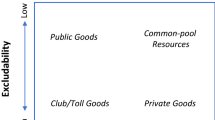Abstract
Economics is the study of how people allocate scarce resources among competing ends. This allocation addresses the production and distribution of goods and services over time and space. It takes place within the context of both human behaviour and organisational structure. In publicly owned fisheries, economics is further concerned with the allocation of access to the resource and with managing the interaction of people with the resource. Fisheries co-management, as an arrangement where responsibility for resource management is shared between the government and user groups, is one approach to allocating access and to managing the interaction.
Access this chapter
Tax calculation will be finalised at checkout
Purchases are for personal use only
Preview
Unable to display preview. Download preview PDF.
Similar content being viewed by others
References
Andersen, P. (1983) On rent of fishing grounds: Translation of Jen Warming’s 1911 article, with an introduction. History of Political Economy 15, 391–96
Arrow, K. (1974) The Limits of Organization. New York: W.W. Norton and Company
Asada, Y., Hirasawa, Y. and Nagasakai, F. (1983) Fishery management in Japan. FAO Fisheries Technical Paper 238. FAO, Rome.
Berkes, F. (1986) Local level management and the commons problem: a comparative study of Turkish coastal fisheries. Marine Policy 10 (3), 215–229.
Berkes, F., ed. (1989) Common Property Resources: Ecology and Community-Based Sustainable Development. Belhaven Press, London.
Eggertsson, T. (1990) Economic Behaviour and Institutions. Cambridge: Cambridge University Press.
Gordon, H.S. (1954) The Economic Theory of a Common-Property Resource: The Fishery. Journal of Political Economy 62, 124–142.
Hanna, S. (1994) Co-management. Pp. 233–242 in Limiting Access to Marine Fisheries: Keeping the Focus on Conservation. Washington, DC: Centre for Marine Conservation and World Wildlife Fund.
Hanna, S. (1995a) Efficiencies of User Participation in Natural Resource Management. In S. Hanna and Munasinghe, M., eds. Property Rights and the Environment: Social and Ecological Issues. Washington, D.C.: World Bank.
Hanna, S. (1995b) User participation and fishery management performance within the Pacific Fishery Management Council. Ocean and Coastal Management 28 (1–3), 23–44.
Hanna, S. (1998a) Co-Management In Small-Scale Fisheries: Creating Effective Links Among Stakeholders. In Proceedings of the International Workshop on Community-Based Resource Management, The World Bank, Washington, D.C., May 10–14, 1998.
Hanna, S. (1998b) Institutions for Marine Ecosystems: Economic Incentives and Fishery Management. Ecological Applications 8(1) Supplement, 170–174.
Hanna, S. (1998c) Managing for Human and Ecological Context in the Maine Soft-Shell Clam Fishery. Pp. 190–211 in F. Berkes and Folke, C., eds. Social and Ecological Linkages for Sustaining Natural Resource Systems. Cambridge: Cambridge University Press.
Jentoft, S. (1989) Fisheries Co-management: Delegating Government Responsibility to Fishermen’s Organizations. Marine Policy 13 (2), 137–154.
Jentoft, S. (1993) Dangling Lines: The Fisheries Crisis and the Future of Coastal Communities. Social and Economic Studies No. 50, Institute of Social and Economic Research, Memorial University of Newfoundland.
Jentoft, S. and Kristoffersen, T. (1989) Fisheries co-management: the case of the Lofoten fishery. Human Organization 48 (4), 355–365.
Kuperan, N.M.R.A.K. and Pomeroy, R.S. (1998) Transactions costs and fisheries co-management. Marine Resource Economics 13, 103–114.
Malasha, L (1996) In search of a new management regime on the northern shores of Lake Kariba. CASS Occasional Paper, University of Zimbabwe.
Matthews, R.C.O. (1986) The economics of institutions and the sources of growth. Economic Journal 96 (December): 903–910.
McGoodwin, J.R. (1994) `Nowadays, nobody has any respect’: the demise of folk management in a rural Mexican fishery. Pp.43–54 in Dyer, C. L. and McGoodwin, J.R., eds, Folk Management in the World’s Fisheries. University Press of Colorado, Niwot, Colorado.
Nielsen, J.R., Vedsmand, T. and Friis, P. (1997) Danish fisheries co-management decision making and alternative management systems. Ocean and Coastal Management.
Olsen, M. (1965) The Logic of Collective Action. Cambridge, MA: Harvard University Press.
Pomeroy, C. (1994) Obstacles to institutional development in the fishery of Lake Capala, Mexico. Pp.17–42 in Dyer, C. L. and McGoodwin, J:R., eds, Folk Management in the World’s Fisheries. University Press of Colorado, Niwot, Colorado.
Pomeroy, R.S. and Pido, M. (1995) Initiatives toward fisheries co-management in the Philippines: the case of San Miguel Bay. Marine Policy 19 (3).
Runge, C.F. (1984) Institutions and the free rider: the assurance problem in collective action. Journal of Politics 46 (1), 154–81.
Schelling, T.C. (1960) The Strategy of Conflict. Oxford: Oxford University Press. 1977 reprint.
Scott, A. D. (1955) The Fishery: The Objectives of Sole Ownership. Journal of Political Economy 63, 116–24
Sen, S. and Nielsen, J.R. (1996) Fisheries co-management: a comparative analysis. Marine Policy 20 (5), 405–418.
Author information
Authors and Affiliations
Editor information
Editors and Affiliations
Rights and permissions
Copyright information
© 2003 Springer Science+Business Media Dordrecht
About this chapter
Cite this chapter
Hanna, S. (2003). The Economics of Co-Management. In: Wilson, D.C., Nielsen, J.R., Degnbol, P. (eds) The Fisheries Co-management Experience. Fish and Fisheries Series, vol 26. Springer, Dordrecht. https://doi.org/10.1007/978-94-017-3323-6_4
Download citation
DOI: https://doi.org/10.1007/978-94-017-3323-6_4
Publisher Name: Springer, Dordrecht
Print ISBN: 978-90-481-6344-1
Online ISBN: 978-94-017-3323-6
eBook Packages: Springer Book Archive




